On this day in the Euros, June 21: Ronald Koeman wipes his backside on Olaf Thon's shirt
On home turf, West Germany were expected to win Euro '88. But the tournament took a dramatic swing when they were drawn against their fiercest rivals in the semi-finals, as Gary Parkinson explains

Eliminated in the Euro 80 groups, the Dutch hadn’t even reached the tournaments in 82, 84 and 86. But by 1988 the Oranje could call on a spine of genuine world-class players entering their prime.
Ronald Koeman was 25; averaging a goal every other game, he had just helped Guus Hiddink’s PSV to the European Cup and domestic league-and-cup double. Frank Rijkaard, also 25 and like Koeman equally comfortable in midfield or defence, was moving that summer to AC Milan.
At Milan already was Marco van Basten, who had suffered an injury-hit first season in Italy but was still only 23 and had bagged 118 goals in 112 matches during his last four Ajax campaigns, collecting the European Golden Boot and Cup Winners’ Cup along the way.
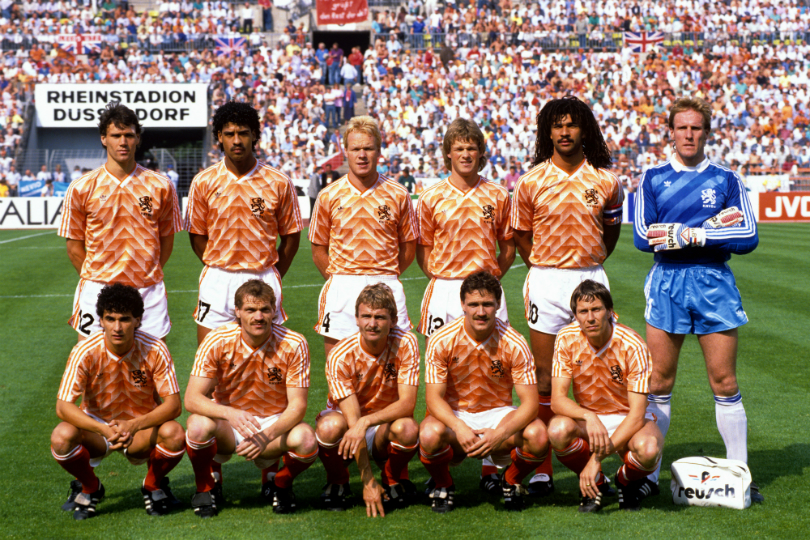
And joining the Milan posse that summer would be the national captain Ruud Gullit, replacing PSG-bound Ray Wilkins for a world record £6m. Equally effective in midfield or attack, Gullit was another flexible player and, at 25, the leader of an exciting young squad in which nobody had more than 35 caps.
All of which made their opening Euro 88 defeat to the Soviet Union the more surprising, but in a meeting of brilliant managerial minds, Totaalvoetbal veteran Rinus Michels had been outwitted by sports-science progenitor Valery Lobanovskiy. In Cologne’s Mungersdorferstadion, the Dynamo Kyiv manager’s packed midfield made the Dutch go longer than they would have preferred, and they lost 1-0.
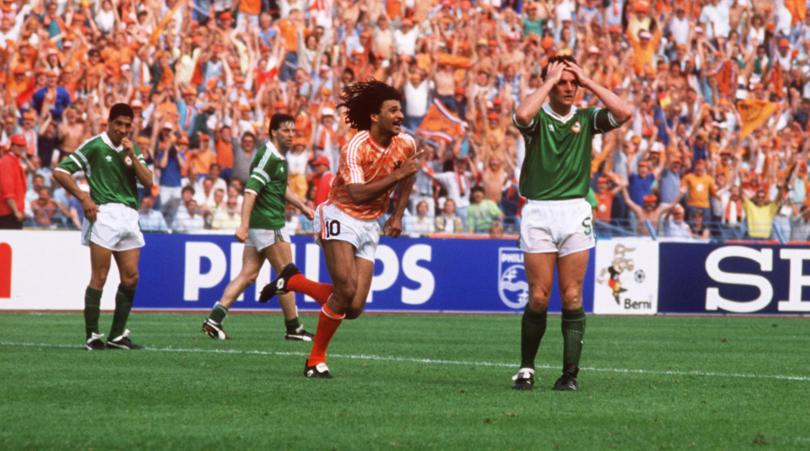
Michels’ men found things much easier against England in Dusseldorf, with Bobby Robson’s side dispatched by a Van Basten hat-trick – and although they struggled to get the win they needed against the Irish in Gelsenkirchen, Wim Kieft’s peculiarly fortunate late header did the job: they were through to the semi-finals.
The old enemy
Get FourFourTwo Newsletter
The best features, fun and footballing quizzes, straight to your inbox every week.
Having finished behind the Soviet Union – who had also beaten a listless England 3-1 – the Dutch knew they would face West Germany. Dutch hatred of Germans stretched back to the five-year occupation during the Second World War, and football hadn’t helped.
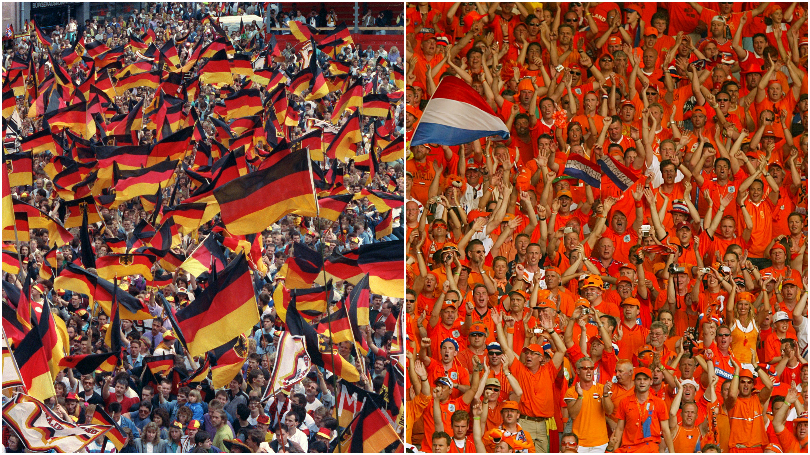
In the 1974 World Cup final in Munich, the teams’ first competitive postwar match, Michels’ team took an early lead and toyed with the hosts; as midfielder Wim van Hanegem put it, “I didn't give a damn about the score. 1–0 was enough, as long as we could humiliate them. I hate them. They murdered my family.” Sadly for Van Hanegem, the Germans equalised and went on to win, and subsequent games between the sides only stoked the rivalry as familiarity bred contempt.
At Argentina 78, Dick Nanninga saw red for pushing Bernd Holzenbein. At Euro 80, Huub Stevens and Toni Schumacher fought on the field and Rene van der Kerkhof punched Bernd Schuster in the face. (Remarkably, French referee Robert Wurtz – a theatrical type who later appeared regularly on the French version of It’s A Knockout – saw fit to merely book Stevens and a presumably perplexed Schuster.)
June 21, 1988
Orange hordes had flowed over the border into the northern port city, bringing with them trumpets, drums and lots of expectation.
The match-up in Hamburg was seen by both sides as the “real final”, whatever happened thereafter: the pressure was intense. German coach Franz Beckenbauer, who had led the team to runners-up spot at Mexico 86, was fully expected to go one better on home soil.
His side hadn’t always impressed in their group – the opening 1-1 draw with Italy was somewhat fortuitous, the 2-0 win over Denmark slightly flattering – but looked much better in the closing 2-0 win over Spain and seemed to be gathering steam.
Der Kaiser was forced to change his plans during the warm-up when jinking Cologne winger Pierre Littbarski complained of a stomach upset; Dortmund striker Frank Mill was picked instead, although Littbarski would replace him for the closing stages, which seems a bit cheeky.
Orange hordes had flowed over the border into the northern port city, bringing with them trumpets, drums and lots of expectation. With Koeman spraying balls right for Gullit and left for Van Basten, the Dutch started well but West Germany came back strongly in what became an end-to-end first half.
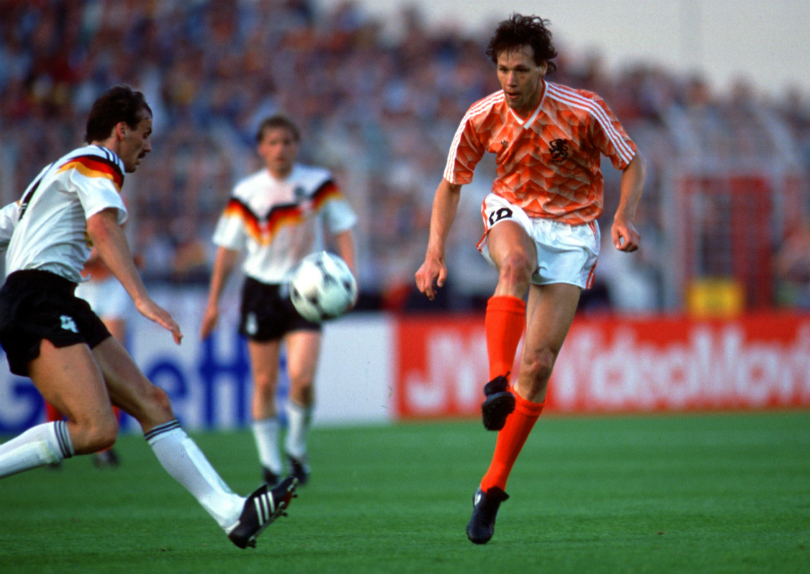
Beckenbauer’s plans were further rearranged by an injury to sweeper Mathias Herget just before the interval, requiring a tournament debut for Hansi Pfugler, a Bayern lifer who had a degree in Civil Engineering (well, you never know).
Decisions, decisions
In the 55th minute, Jurgen Klinsmann cut across Rijkaard’s extended leg and, with archer’s-bow back-fling and an extra roll for good measure, won a penalty.
If the first half had been entertaining, the second started explosively. Gerald Vanenburg sent Erwin Koeman through on goal but Eike Immel came out to smother; in the process of leaping the sprawling goalkeeper, Koeman caught Immel and the sides were soon squaring up.
In the 55th minute, Jurgen Klinsmann cut across Rijkaard’s extended leg and, with archer’s-bow back-fling and an extra roll for good measure, won a penalty. There followed a curious delay while referee Ioan Igna fussed over the placement of the ball, but the Romanian ref had previous: at Mexico 86, he had infamously and incorrectly allowed a shootout ‘goal’ to stand when Bruno Bellone’s effort for France against Brazil hit the post, then the keeper, then went in. (The law was subsequently changed to address this situation; such goals are now legal.)
Lothar Matthaus wasn’t to be fazed by such delays and sent the ball to Hans van Breukelen’s left; the Dutch keeper got his hands to it but couldn’t stop it going in.
The Oranje were enraged. Adri van Tiggelen clattered Matthaus and when Rudi Voller went down under a Jan Wouters challenge, three Dutchmen surrounded the striker and Ronald Koeman shoved him to the ground.
However, perhaps remembering the lessons of 1974, Michels’ men remembered to play football. Yet another Koeman raker sent Van Basten into the area against Jurgen Kohler, who went to ground – and so did Van Basten. Another questionable penalty, dispatched by Koeman, fittingly in the 74th minute.
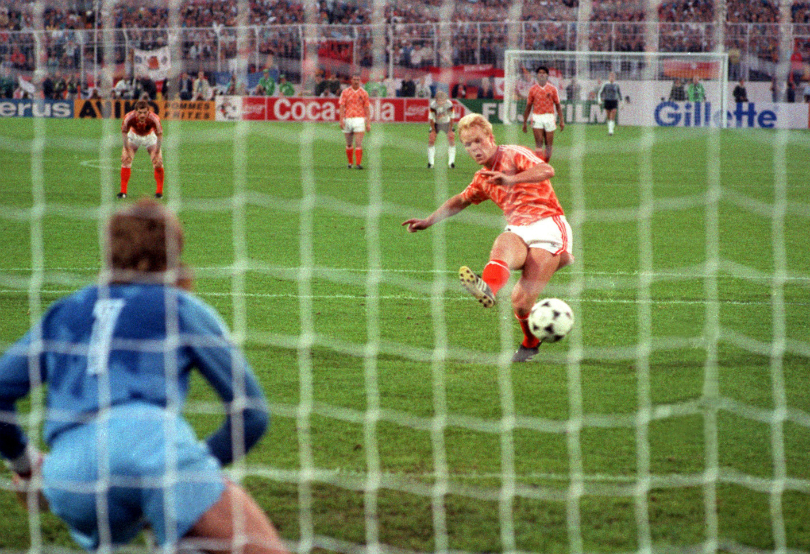
With sub Littbarski adding spark for the Germans, Koeman was called into defensive duty, intercepting the winger’s cross before the waiting Voller could tuck it home.
And with two minutes to go, Koeman found Jan Wouters, who rolled a through-ball for Van Basten. Running across Kohler, the striker stretched out to poke the ball past Immel. The Dutch had beaten their old foes at last.
Celebrating like men possessed, the Dutch players drank in the victory with their fans in the Hamburg evening, although not everybody can look back proudly on their celebrations. German flags were burnt on the terraces, and Koeman, who had swapped shirts with Olaf Thon, delighted the visiting fans by pretending to wipe his backside with it. Asked later if he regretted his actions, Koeman said not. The Dutch has exorcised their demons, but heightened the rivalry.
What happened next
Enlivened by an extravagantly brilliant Van Basten volley, the Netherlands’ 2-0 final win over the Soviet Union brought the country its first major silverware, but as Rinus Michels acknowledged: “We won the tournament, but we all know that the semi-final was the real final".
Michels stepped down after the Euros, but would return after Leo Beenhakker’s Italia 90 campaign was brought to an end at the first knockout stage… by West Germany, in another controversial 2-1 marred by the expulsions of Rijkaard and Voller for fighting; as they walked off, the Dutchman spat at the German.
Beckenbauer’s team would go on to win that World Cup, making him only the second man (after Mario Zagallo) to win it as a player and a manager.
Euro 2016 guide • Euro 2016 news
Gary Parkinson is a freelance writer, editor, trainer, muso, singer, actor and coach. He spent 14 years at FourFourTwo as the Global Digital Editor and continues to regularly contribute to the magazine and website, including major features on Euro 96, Subbuteo, Robert Maxwell and the inside story of Liverpool's 1990 title win. He is also a Bolton Wanderers fan.
